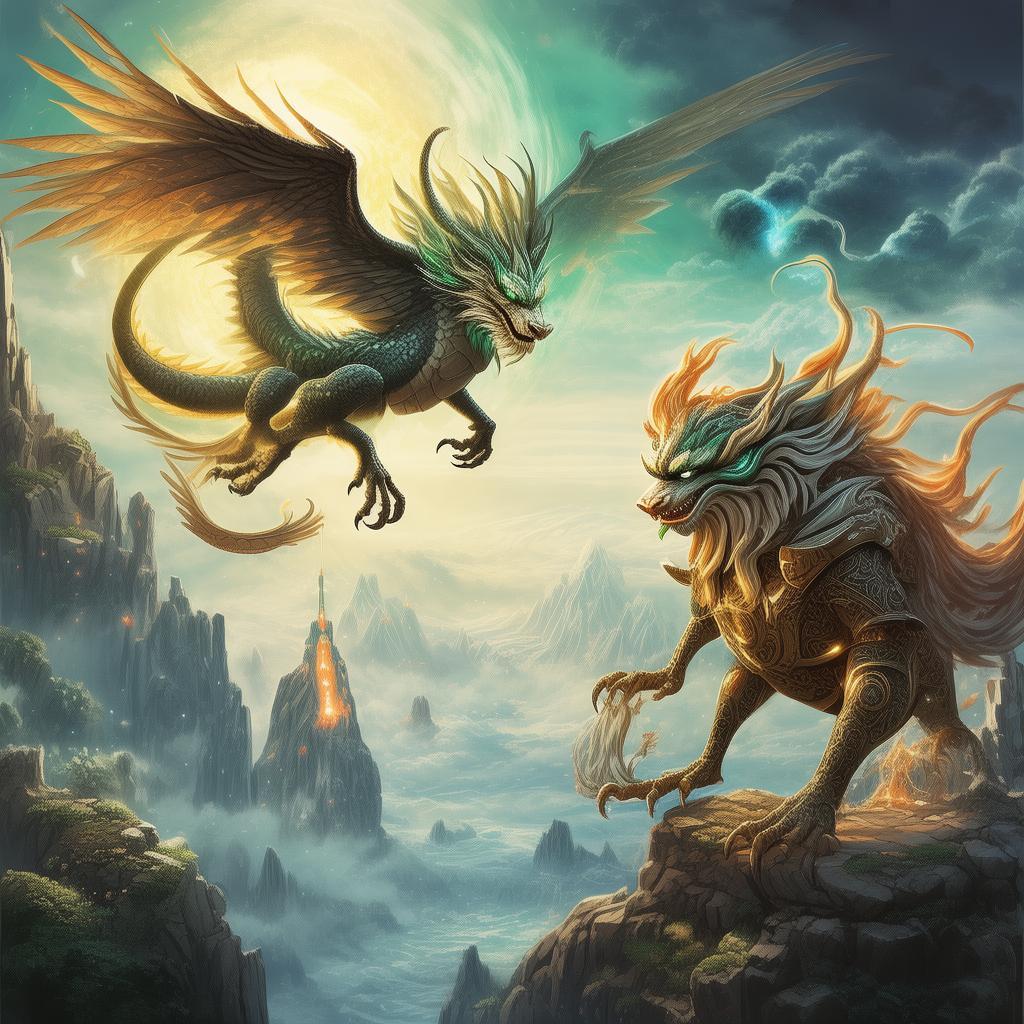The Labyrinth of Apollo: A Quest for the Golden Lyre
In the heart of ancient Greece, where the gods and mortals mingled, there was a tale that few dared to speak of. It was a story of a golden lyre, its strings made of the finest silk and its sound capable of soothing the wild beasts and calming the stormy seas. This lyre was the prized possession of Apollo, the god of music, prophecy, and the sun. But one fateful night, the lyre was stolen, and with it, the balance of the pantheon was thrown into disarray.
Amidst the bustling city of Delphi, where the Oracle of Delphi resided, there lived a young musician named Orpheus. Orpheus was not just any musician; he was a prodigy, whose melodies could move the stones and make the trees dance. It was said that even the gods themselves would listen to his music, enchanted by its beauty.
One day, as Orpheus was practicing his lyre under the shade of an ancient olive tree, the Oracle of Delphi approached him. Her eyes, deep as the Aegean Sea, held a secret that only the purest of hearts could perceive. "Orpheus," she began, her voice like the rustle of leaves in the wind, "a great evil has befallen Apollo. His golden lyre, the source of his divine power, has been stolen. The balance of the pantheon is at risk. You must venture into the Labyrinth of Daedalus to retrieve it."
Orpheus knew the Labyrinth of Daedalus, a place of endless twists and turns, where the very walls seemed to whisper secrets of old. It was a place where many had ventured and none had returned. But the Oracle's words were clear as the sound of Apollo's lyre. "You must go, Orpheus," she repeated. "The fate of the pantheon rests upon your shoulders."

With a heavy heart, Orpheus accepted the quest. He knew that he would face many challenges, but he also knew that he had a gift that could help him. His lyre, though not as powerful as Apollo's, could still move the hearts of men and gods alike.
The journey began at the gates of the Labyrinth, where the air was thick with the scent of ancient stone and the hum of forgotten secrets. Orpheus took a deep breath and stepped inside. The walls closed in around him, and he could feel the weight of the labyrinth's history pressing down upon him.
As he ventured deeper, he encountered creatures of myth and legend. The Minotaur, with its fearsome bull head and human body, loomed before him, its eyes glowing with a malevolent light. But Orpheus played his lyre, and the Minotaur, enchanted by the music, stepped aside, allowing him to pass.
Next, there was the Sirens, their voices like sweet melodies that could lull a man to sleep or drive him mad. But Orpheus played his lyre with even more fervor, and the Sirens, captivated by the beauty of his music, turned away from him.
Each creature he encountered, from the Gorgons to the Chimaera, was defeated by the power of his music. But as he reached the heart of the labyrinth, he found that the thief of Apollo's lyre was none other than Echidna, the fearsome mother of all monsters.
Echidna, with her snake-like tail and humanoid form, stood before him, her eyes gleaming with malice. "You think you can retrieve Apollo's lyre?" she hissed. "You are but a mortal, and I am the mother of the gods!"
Orpheus did not flinch. "I am more than a mortal," he declared, "I am a musician, and my lyre can move the very heart of the gods." With that, he began to play, his fingers dancing across the strings, and the music filled the air, resonating with the very essence of the labyrinth.
Echidna, caught in the spell of Orpheus's music, softened. "You have a gift," she admitted. "But the lyre is mine now. It is the key to my power."
Orpheus knew that he could not win a physical battle with Echidna, but he had one last card to play. "I will give you the lyre," he said, "but you must promise to return it to Apollo and restore the balance of the pantheon."
Echidna hesitated, her eyes reflecting the internal struggle. "Very well," she finally agreed. "I will give you the lyre, but you must trust me."
With a nod of her head, Echidna handed over the golden lyre. Orpheus took it, his heart pounding with hope and fear. He turned on his heel and made his way back through the labyrinth, the lyre clutched tightly in his arms.
As he emerged from the labyrinth, Apollo appeared before him, his eyes filled with gratitude. "Thank you, Orpheus," he said. "You have restored the balance of the pantheon. The lyre is safe once more."
Orpheus nodded, his heart light with relief. "I did it for the balance," he replied, "and for the music that binds us all."
And so, the golden lyre was returned to Apollo, and the balance of the pantheon was restored. Orpheus's name became legendary, not just for his musical prowess, but for his bravery and his quest to retrieve the lyre that could have been lost forever.
✨ Original Statement ✨
All articles published on this website (including but not limited to text, images, videos, and other content) are original or authorized for reposting and are protected by relevant laws. Without the explicit written permission of this website, no individual or organization may copy, modify, repost, or use the content for commercial purposes.
If you need to quote or cooperate, please contact this site for authorization. We reserve the right to pursue legal responsibility for any unauthorized use.
Hereby declared.









